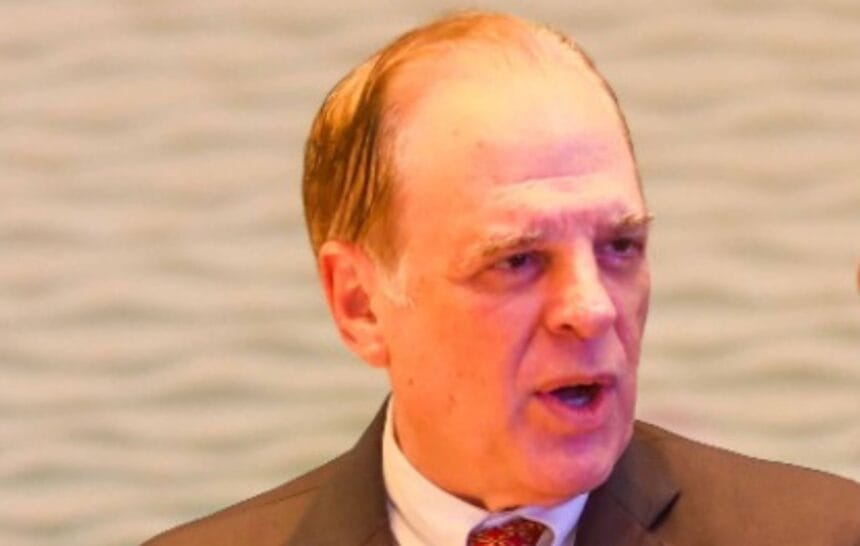“Large majority of petrol price increases we have seen in past year are due to fall in value of Naira”
Dickerman made this known at the recently concluded annual strategic international conference of the Association of Energy Correspondents of Nigeria (NAEC) in Lagos,
According to him, only NNPC Trading Limited (NTL) has the capacity to purchase petroleum products from Dangote and pay market rates, while still being able to sell at a subsidized price.
He added that no independent marketer could sustain such a business model.
“The assumption that this arrangement is part of some underhanded scheme to benefit specific parties is entirely untrue.
“This is simply one of the consequences of subsidies. As a result, Nigeria lacks a competitive market, NNPC controls national distribution, and domestic fuel prices remain significantly lower than in neighboring countries, creating strong incentives for smuggling,” the Pinnacle MD stated.
Dickerman pointed out the confusion and anxiety that currently pervade Nigeria’s downstream petroleum sector. While the anxiety is understandable, he noted, the confusion is avoidable with a clear understanding of the market dynamics, key players, and their incentives.
He further highlighted that government policies significantly influence consumer behavior, and economic principles cannot be disregarded.
While there is much speculation about Dangote Refinery’s recent production of gasoline and distillates, Dickerman reminded stakeholders that NNPCL is wholly government-owned, operating for profit while fulfilling national and political mandates.
He also raised concerns about the declining availability of crude oil for sale by NNPC, attributing it to production challenges, crude forward sales, and loans collateralized by crude oil.
According to Dickerman, selling crude to Dangote in Naira would forgo potential foreign exchange earnings, though local sales in Naira could offset this loss by reducing the need for costly fuel imports.
The Pinnacle Oil CEO’s remarks underscored the complex realities of Nigeria’s petroleum market, warning against oversimplification and unrealistic price expectations.
Pinnacle Oil and Gas Limited CEO, highlighted that while NNPC holds approximately seven percent equity in Dangote Refinery and Petrochemical, operational control of the facility remains firmly in private hands.
He explained that that is due to the refinery being funded through significant risk capital, comprising both equity and debt, much of which is in U.S. dollars.
Dickerman emphasized that crude oil and petroleum products are globally priced in U.S. dollars, a practice established since the first oil well was drilled in Pennsylvania in 1859.
“When we import products, whether the buyer is NTL or a private marketer, we must pay the global market price, adjusted for quality and location, in dollars,” he stated.
He noted that this cost, converted to Naira at the prevailing exchange rate—currently around ₦1,700—forms the market price at terminals, gantries, and retail pumps.
Any price lower than this, he added, is due to Nigerian subsidies, which represent the gap between the market price and the selling price.
The CEO pointed out that investors in the Dangote Refinery expect market prices for their products, aiming to achieve industry-standard returns on refining margins, known as “crack spreads,” benefiting from the plant’s economies of scale.
Dickerman also reminded Nigerians that the refinery has the option to export its products at global market prices, which incentivizes optimization strategies for any investor or operator.
In his further remarks, Dickerman emphasized that Nigeria’s ongoing petroleum subsidy, supported by discounted foreign exchange via NNPC, continues to keep fuel prices at both wholesale and retail levels below actual market rates.
However, he warned that this system is unsustainable, given the investors’ expectations of market-based returns.
“The refinery can export to vessels at market price in USD or sell directly to other countries.
“If a business can sell a product at a higher price to one customer, why would it sell at a lower price to another?” he noted
To address the root issues driving high petroleum prices in Naira, Dickerman underscored the need for Nigeria to restore global confidence in its economy and currency.
This, he argued, would encourage foreign investment, boost local production, and enhance tax revenues, which, combined with fiscal prudency, are the key measures required to sustainably lower petroleum product prices in the country.




